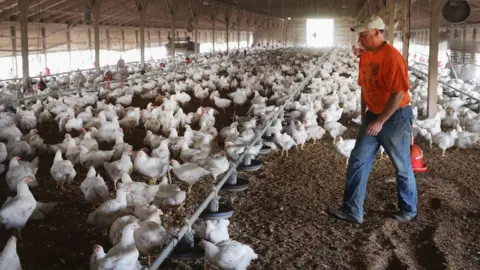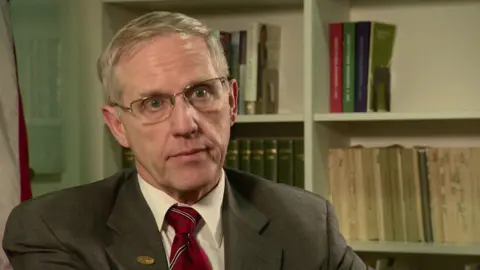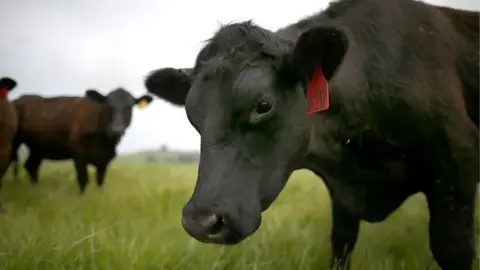US farmers say chlorine-washed chicken should be part of a UK free trade deal
 Getty Images
Getty ImagesChlorine-washed chicken and hormone-injected beef should be part of a UK/US free trade deal, a farming union said.
Roger Johnson, president of America's National Farmers Union, said US food was "perfectly safe" and there had been a lot of "fear-mongering".
The politically-influential union represents more than 200,000 US farms.
Mr Johnson also told the BBC that a free trade deal would open up the huge US market to British products in a boost for UK farmers.
Agricultural products are likely to form a central part of any free trade deal with America that both the UK and US governments have said they want to sign when Brexit has been completed.
Any deal is likely to be controversial and the British National Farmers Union has already made it clear its reservations about allowing open access to US food products.
American food standards have been criticised in the UK and the European Union prohibits many US products.
They include chicken, which is routinely washed in chlorine to remove bacteria; beef injected with growth hormones and pork injected with the drug ractopamine, which aids the building of muscle mass in pigs.
The EU and the US also have very different approaches to genetic modification, with America allowing it in many crops that are exported.
The EU is more cautious and any opening up of the market between the US and the UK on food could affect the UK's trade with the rest of Europe, where much of Britain's food exports are sent.

The United States Trade Representative, which draws up policy recommendations for the President, said that the EU bans on American food "unnecessarily restrict trade" and were not based on "scientific principles".
With the UK due to leave the EU and the single market and the government planning to quit the customs union, the UK will able to sign free trade deals with other countries, including America.
"I would not argue that it is a lower standard, I would argue it's a different standard," Mr Johnson told me about the different scientific approaches on either side of the Atlantic.
He said that America was more "risk-tolerant": "I think it is fair to say that the standards that we follow allow for more rapid scientific advancement, that a more cautionary approach [from the EU] means that scientific advances are going to happen more slowly.
"The trade negotiations need to figure out a way to allow both of these standards to be used and in a way that is honest and truthful - and let consumers choose."
 Getty Images
Getty ImagesMr Johnson said that strong cultural and political links between the US and Britain meant that agreement was possible and stronger trade would be a boost to the economies of both countries.
He also argued that clear labelling would be important so that consumers could decide what they wanted to buy.
There was also a growing market in America for British products because of the different standards, which were often a "fashionable" choice for many Americans.
"Why is it that it is governments that are saying 'no you're not allowed to do this' or 'you're not allowed to do that' if the processes are judged to be safe, in one or both of the countries?" he said.
"Let's be transparent about it and let the consumers make the decision. There's a lot of fear-mongering that happens around these kinds of things: 'Oh my god, we don't want to be eating chlorine, that's a gas that kills people'.
"You know what - water is a liquid that drowns people; it doesn't mean we don't drink it."
